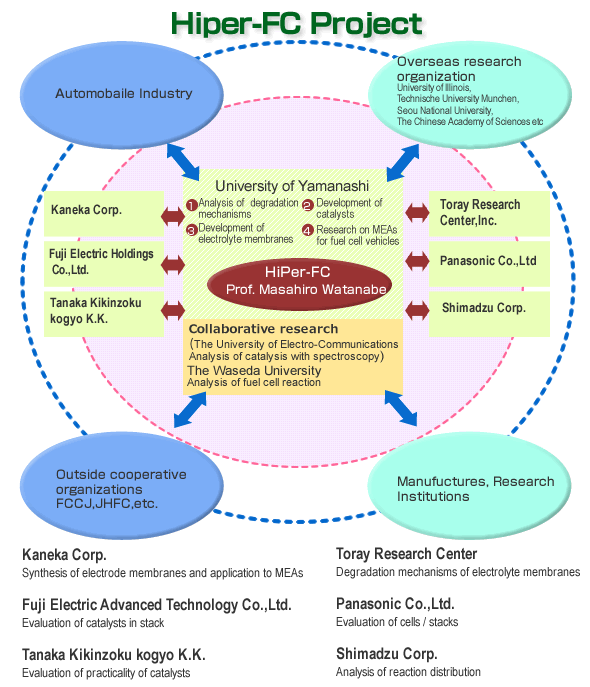Project Objectives
For the widespread proliferation of fuel cells, significant cost reductions and improvements in durability and reliability are necessary. Innovative efforts, leading to breakthroughs in these areas, are being eagerly awaited in industry; therefore, it is necessary to undertake a research and development program that is founded on basic science.
The HiPer-FC (High Performance Fuel Cell) Project, was initiated in April, 2008 and is planned to have a seven-year duration. The University of Yamanashi is playing a key role in this NEDO-funded technology development project. Key aspects are the elucidation of deterioration mechanisms and the fusion of cutting edge technologies, for example, nanomaterials, with existing technologies to study and develop new fuel cell materials such as catalysts, electrolyte membranes, and membrane-electrode assemblies (MEAs). The overall goal is to contribute to the actual widespread utilization of fuel cells by establishing a basic technology in which high efficiency, high reliability, and low cost can be realized at the same time.
Thus, the official name of the project is “Strategic Development of PEFC Technologies for Practical Application / Research on Nanomaterials for High Performance Fuel Cells”
Research Items
- 1. Analysis of degradation mechanisms
- In order to understand how fuel cell components degrade during operation, we are using several approaches. For example, we have been examining the effects of various factors on the degradation rates and mechanisms of electrocatalists, including dynamic load variations and the presence of impurities. We have also been examining the effect of high temperature – low humidity conditions on the hydrocarbon-based ionomer membranes and on the reaction distribution in the cell. Also, to elucidate the degradation mechanism, we are developing accelerated test methods for various degradation modes, and we will feed back the degradation mechanism analysis results into the development process.
- 2. Research and development of catalysts with high activity and high durability
- To achieve high activity and high load variation tolerance, based on the knowledge provided by the research on degradation mechanisms, we are developing and evaluating Pt alloy catalysts with high activity and low solubility, electrocatalysts with stability for high voltage, and steam reforming catalysts with high activity, high durability and low steam/carbon ratio.
- 3. Development of electrolyte membranes for a wide range of temperatures and low humidity conditions
- To cope with the wide range of temperatures and low humidity conditions that a fuel cell automobile will encounter, we are developing and evaluating hydrocarbon membranes with high proton conductivity and dimensional stability, as well as oxidative and hydrolytic stability. Thus, we are improving the characteristics of membranes specifically for conditions of high temperature and low humidity, as well as low temperature.
- 4. Research for high performance, high reliability MEAs for automobile use
- To optimize the performance for the operation conditions that a fuel cell automobile is likely to encounter, we are developing and evaluating hydrocarbon membrane-based MEAs with high catalyst utilization, as well as those with tolerance of temperature cycling and load variations.
Targets of the project
- To develop MEAs that can start up at a temperature of -30℃ and operate at temperatures up to 100 ℃ and a relative humidity (RH) of 30%.
- The electrical efficiency should be greater than 64% LHV (lower heating value) at 25% of the rated load.
- Durability of 5000 operating hours and 60000 on-off operations is expected.
- Assuming actual use in automobiles, during mass production, the electrolyte cost should be an estimated 1,000 yen/m2.
- The consumption of precious metal catalysts such as platinum should be less than 0.1 g/kW.
Organization of the Research and Development
Under the project manager Univercity of Yamanashi is carrying out the research and development in corporation with Kaneka Corp., Toray Research. Center, Inc., Fuji Electric Holdings Co.,Ltd., Tanaka Kikinzoku Kogyo K.K., Shimadzu Corp., Panasonic Co.,Ltd., Univ.of Tokyo and Waseda Univesity.


